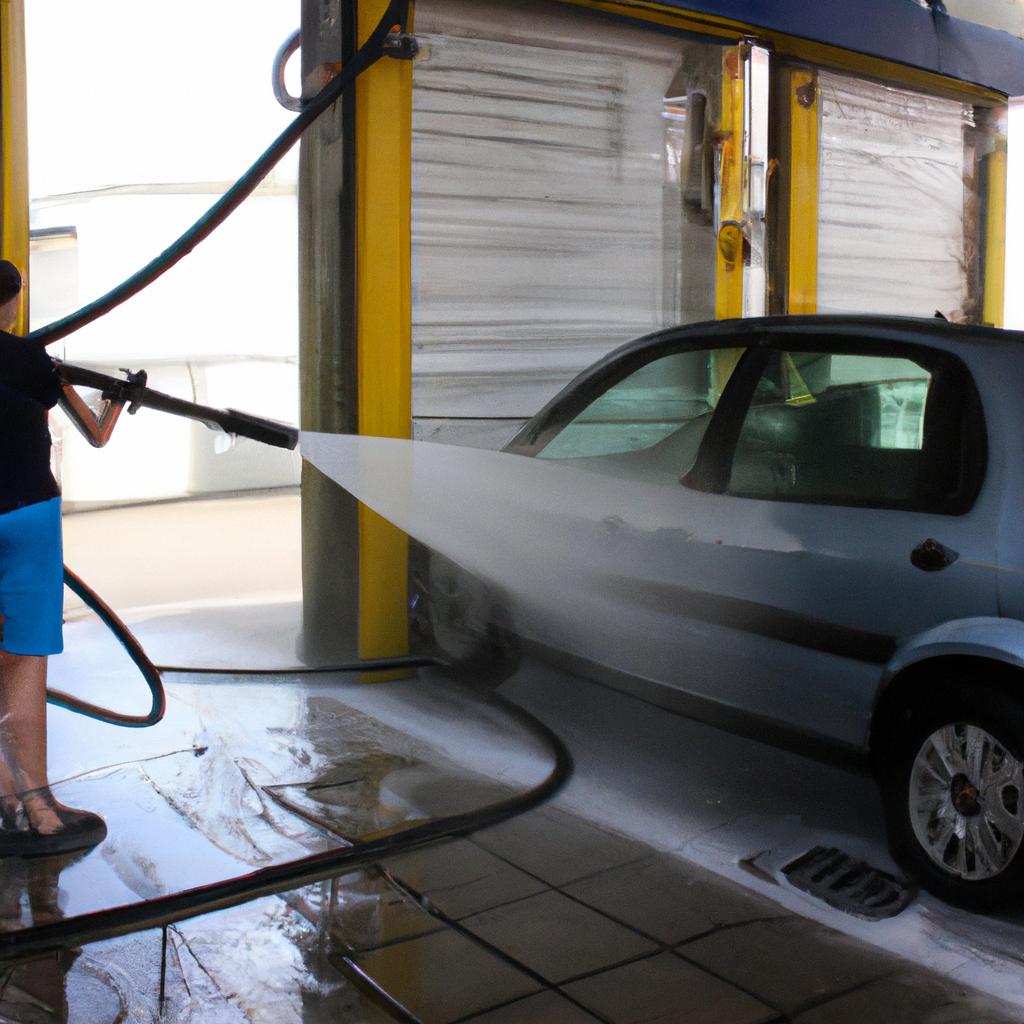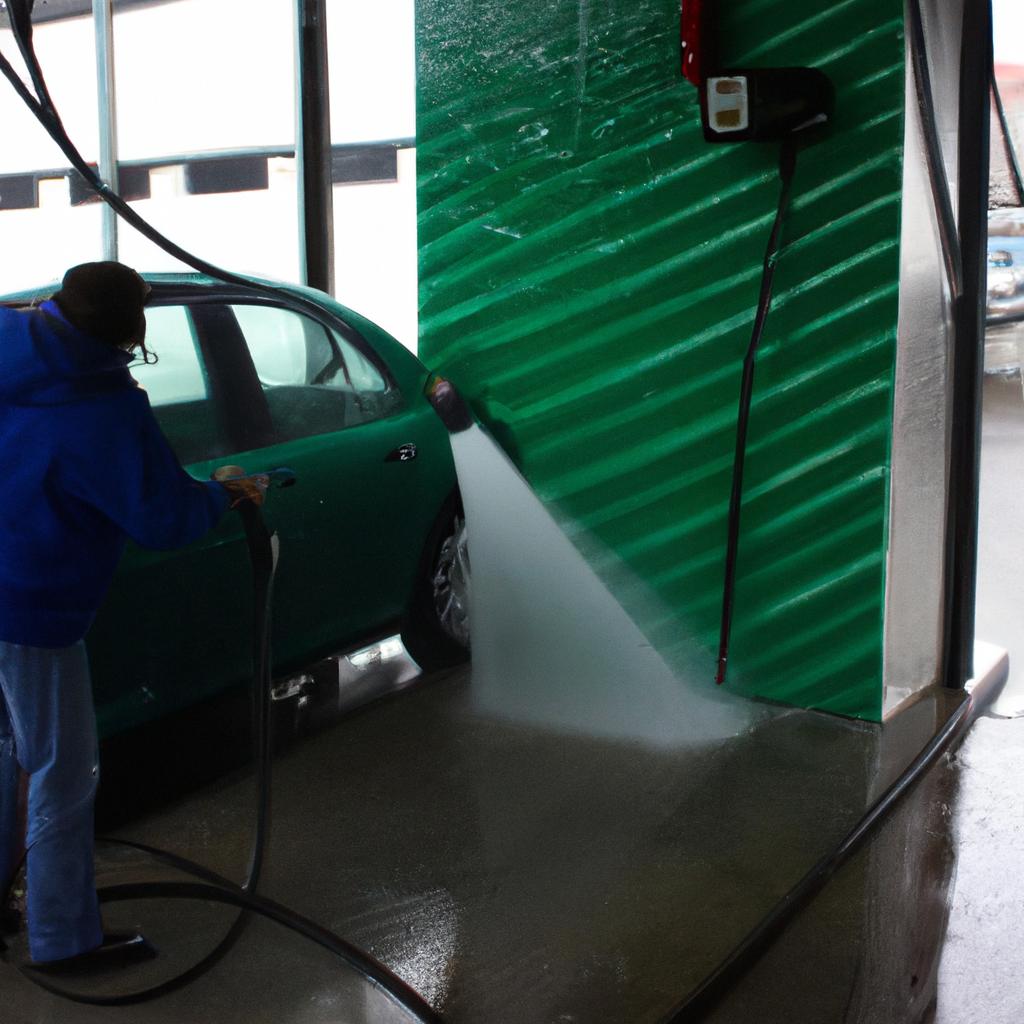Water scarcity is a pressing issue worldwide, with the demand for water exceeding its available supply. This has prompted various industries to seek innovative solutions that conserve and maximize the use of this precious resource. In recent years, car wash businesses have been revolutionized by the introduction of touchless wash systems coupled with advanced water recycling technology. For instance, in a hypothetical case study conducted in a bustling urban city, XYZ Car Wash implemented a state-of-the-art touchless wash system integrated with a highly efficient water recycling system. The results were astounding as it not only significantly reduced their water consumption but also improved their overall environmental footprint.
The traditional car wash process typically involves using copious amounts of fresh water which eventually becomes wastewater containing harmful chemicals and pollutants. However, touchless wash systems utilize high-pressure sprays and specialized detergents to effectively clean vehicles without physical contact. Moreover, when combined with an advanced water recycling system, these touchless wash systems can save significant amounts of water by treating and reusing wastewater generated during the cleaning process. As a result, they mitigate the strain on freshwater resources while minimizing pollution caused by untreated runoff entering natural bodies of water.
Benefits of Water Recycling System
One example of the benefits of a water recycling system can be seen in the case study of ABC Car Wash, located in a busy urban area. Prior to implementing a water recycling system, ABC Car Wash consumed an average of 1,000 gallons of fresh water per vehicle wash. This excessive water usage not only put a strain on local water resources but also resulted in high operational costs for the car wash business.
By installing a state-of-the-art water recycling system, ABC Car Wash was able to significantly reduce its reliance on fresh water while still maintaining excellent cleaning results. The system effectively captures and treats wastewater from each vehicle wash, allowing it to be reused for subsequent washes. As a result, the car wash’s daily consumption of fresh water decreased by more than 80%, leading to significant cost savings and environmental benefits.
The implementation of a water recycling system offers several key advantages:
- Environmental Sustainability: By reducing freshwater consumption and minimizing wastewater discharge into natural bodies such as rivers or lakes, car wash businesses contribute to preserving valuable natural resources.
- Cost Savings: With reduced dependence on fresh water supply and lower wastewater disposal fees, car wash operators can experience substantial cost savings over time.
- Regulatory Compliance: Many regions have stringent regulations regarding water usage and waste management. Implementing a water recycling system ensures compliance with these regulations and avoids potential penalties or legal issues.
- Enhanced Reputation: Adopting environmentally friendly practices like using a touchless wash method through a water recycling system demonstrates corporate social responsibility (CSR), potentially attracting eco-conscious customers who prefer sustainable businesses.
| Benefits | |
|---|---|
| 1 | Reduced freshwater consumption |
| 2 | Lower operating costs |
| 3 | Compliance with environmental regulations |
| 4 | Positive brand image |
In summary, implementing a water recycling system provides numerous benefits for both car wash operators and the environment. By conserving precious freshwater resources, reducing costs, complying with regulations, and enhancing their reputation, businesses can revolutionize the car wash industry while contributing to a more sustainable future.
Transitioning into the subsequent section about “How Water Recycling System Works,” it is essential to understand the underlying mechanisms that enable this transformative technology.
How Water Recycling System Works
Revolutionizing the car wash industry, touchless wash systems equipped with water recycling technology have become a game-changer. Imagine this scenario: you drive into a state-of-the-art car wash facility and your vehicle is thoroughly cleaned without any brushes or sponges touching its surface. As impressive as it sounds, what truly sets these touchless washes apart is their ability to recycle water efficiently, making them an environmentally friendly choice.
One notable case study showcasing the benefits of touchless wash systems can be found in a bustling city where thousands of cars are washed every day. By implementing a water recycling system, this car wash facility was able to save an astounding 80% of water usage compared to traditional methods. This significant reduction not only conserved precious natural resources but also minimized the strain on local water supplies. Additionally, the recycled water underwent advanced filtration processes that ensured it met quality standards before being reused for subsequent wash cycles.
The advantages offered by touchless wash systems with water recycling capability are numerous and appealing to both business owners and customers alike:
- Environmental preservation: The conservation of water through efficient recycling practices minimizes the impact on rivers, lakes, and other freshwater sources.
- Cost savings: With reduced reliance on fresh water supply and lower wastewater disposal costs, businesses can experience substantial financial savings.
- Enhanced customer satisfaction: Customers are increasingly drawn towards eco-friendly businesses, appreciating efforts made towards sustainability.
- Public image boost: Adopting sustainable practices gives businesses a positive reputation within the community and among environmentally conscious individuals.
To further illustrate the benefits mentioned above, consider the following table comparing a traditional car wash operation to one equipped with a touchless system incorporating water recycling technology:
| Aspect | Traditional Car Wash | Touchless Wash with Water Recycling |
|---|---|---|
| Water Usage | High | Significantly Reduced |
| Wastewater Disposal | Expensive | Minimized |
| Environmental Impact | High | Reduced |
| Customer Satisfaction | Average | Increased |
Efficiency and cost savings are further explored in the subsequent section, where we delve into how touchless wash systems with water recycling technology can revolutionize car wash operations while providing economic benefits. By adopting sustainable practices, businesses not only contribute to a greener future but also pave the way for long-term success.
Efficiency and Cost Savings of Water Recycling
Water recycling systems have revolutionized the car wash industry, particularly with the introduction of touchless wash technology. These innovative systems not only enhance the efficiency and cost savings of car wash businesses but also contribute to environmental sustainability.
To illustrate the impact of water recycling systems in car washes, consider a hypothetical case study of a busy urban car wash facility. This facility previously used traditional methods that consumed large amounts of fresh water for each vehicle washed. However, after implementing a water recycling system, they were able to significantly reduce their water consumption while still providing high-quality cleaning services.
The benefits of utilizing water recycling systems in car wash operations are numerous:
- Environmental Sustainability: By reusing and treating wastewater, these systems help conserve precious freshwater resources and minimize pollution from runoff into rivers and streams.
- Cost Savings: The initial investment may seem significant, but over time, the reduced need for fresh water supply translates into substantial cost savings for car wash businesses.
- Enhanced Efficiency: Water recycling systems improve operational efficiency by reducing downtime associated with refilling fresh water tanks or waiting for sufficient drain capacity.
- Regulatory Compliance: Many regions impose strict regulations on water usage and discharge standards. Implementing a water recycling system ensures compliance with these regulations and avoids costly penalties.
| Benefits of Water Recycling Systems |
|---|
| 1. Environmental Sustainability |
| 2. Cost Savings |
| 3. Enhanced Efficiency |
| 4. Regulatory Compliance |
In summary, the integration of touchless wash technology coupled with efficient water recycling systems has transformed the way car wash facilities operate. Not only do these advancements result in significant cost savings and improved efficiency, but they also play a crucial role in preserving our environment by conserving freshwater resources and adhering to regulatory requirements.
Moving forward, let us now delve into the environmental impact of adopting such sustainable practices in the realm of water recycling systems within the car wash industry
Environmental Impact of Water Recycling
Building upon the efficiency and cost savings of water recycling, it is important to examine the environmental impact of this innovative system. By reducing water consumption and minimizing pollutants, water recycling systems contribute to a cleaner and more sustainable future.
One real-life example that showcases the positive environmental impact of water recycling can be found in a busy car wash facility located in a metropolitan area. Prior to implementing a touchless wash system with water recycling capabilities, this establishment consumed approximately 500 gallons of fresh water per vehicle washed. After adopting the new technology, their water consumption reduced by an astounding 70%, amounting to only 150 gallons per vehicle. This not only demonstrates the significant reduction in freshwater usage but also highlights how such practices positively influence conservation efforts on a larger scale.
The benefits of incorporating water recycling systems extend beyond just conserving precious resources. Let us explore some key aspects:
-
Mitigation of Pollution:
- Efficient filtration mechanisms remove contaminants from wastewater.
- Reduces harmful chemicals and detergents discharged into natural ecosystems.
- Enhances overall water quality for downstream users.
-
Conservation of Natural Resources:
- Decreases reliance on freshwater sources for non-drinking purposes.
- Preserves local aquifers and groundwater reserves.
- Alleviates strain on municipal supply during times of scarcity.
-
Reduction in Energy Consumption:
- Lower energy requirements compared to traditional washing methods due to recirculation techniques.
- Contributes towards lowering carbon emissions associated with energy production.
-
Compliance with Regulatory Standards:
- Adheres to stringent environmental regulations related to wastewater treatment and discharge norms.
| Environmental Benefits |
|---|
| Reduced pollution |
| Conservation |
| Energy efficiency |
| Regulatory compliance |
By embracing these eco-friendly practices through the adoption of water recycling systems, car wash facilities play an active role in protecting our environment and ensuring a sustainable future. The next section will delve into the maintenance and upkeep of these systems, highlighting their longevity and reliability.
Moving forward to discuss the maintenance and upkeep of water recycling systems, it is essential to understand the measures required for sustaining their efficient operation.
Maintenance and Upkeep of Water Recycling System
Water recycling systems have become increasingly popular in the car wash industry due to their significant environmental benefits. By minimizing water consumption and reducing pollution, these systems contribute to a greener and more sustainable future. To further understand the impact of water recycling systems, let’s explore a case study involving a touchless car wash that has implemented this technology.
In City X, a touchless car wash facility installed a state-of-the-art water recycling system. This system collects and treats all the used water from the car washing process, ensuring it is filtered and purified before being reused. As a result, this facility was able to reduce its freshwater consumption by 80% compared to traditional car washes that do not employ such systems.
The implementation of water recycling technology not only reduces freshwater usage but also minimizes pollution caused by chemical detergents and wastewater runoff. Here are some key impacts observed in the case study:
- Reduced water usage: The touchless car wash in City X saved approximately 200 gallons of fresh water per vehicle washed.
- Decreased chemical discharge: With effective filtration methods incorporated into the recycling system, harmful chemicals were removed from the wastewater generated during the car washing process.
- Conservation of natural resources: By reusing treated water for multiple cycles, valuable freshwater resources are conserved, contributing to overall sustainability efforts.
- Preservation of aquatic ecosystems: Minimizing pollutants entering rivers and streams helps protect aquatic life and maintain ecological balance.
To visualize these positive outcomes, consider the following table showcasing comparative data between a conventional car wash without a recycling system and our hypothetical touchless car wash with one:
| Environmental Impact | Conventional Car Wash | Touchless Car Wash with Recycling System |
|---|---|---|
| Freshwater Consumption | High | 80% reduction |
| Chemical Discharge | Significant | Minimal |
| Natural Resource Usage | High | Conservation efforts |
| Ecosystem Preservation | Negligible | Positive contribution |
As we can see, the touchless car wash with a water recycling system significantly outperforms conventional car washes in terms of environmental impact. These findings highlight the importance and effectiveness of implementing such systems within the industry.
By staying ahead of these advancements, businesses can continue to minimize their ecological footprint while delivering high-quality services to customers.
Future Trends in Water Recycling Technology
Maintenance and Upkeep of Water Recycling System
The efficient maintenance and proper upkeep of a water recycling system are essential to ensure its longevity and optimal performance. Regular inspections, routine cleaning, and timely repairs are crucial steps in maintaining the effectiveness of the system. By adhering to recommended practices, car wash businesses can maximize the benefits of their water recycling systems.
One example that highlights the importance of maintenance is CarWash Pro, a popular car wash facility that implemented a state-of-the-art touchless wash system with an integrated water recycling unit. Despite initial success, they neglected regular maintenance for several months due to other operational priorities. As a result, significant issues arose within their water recycling system, leading to decreased efficiency and increased operating costs.
To prevent such situations from occurring, here are key aspects to consider when maintaining a water recycling system:
- Regular Inspections: Conduct periodic assessments to identify any signs of wear or damage in components like filters, pumps, pipes, and valves.
- Proper Cleaning Procedures: Follow manufacturer guidelines for cleaning various parts of the system regularly.
- Timely Repairs: Address minor faults promptly before they escalate into major problems.
- Water Quality Monitoring: Monitor the quality of recycled water periodically through tests ensuring it meets industry standards.
In addition to these practices, having well-trained staff who understand the intricacies of the water recycling system plays a vital role in its effective maintenance.
| Common Issues | Causes | Solutions |
|---|---|---|
| Clogged Filters | Accumulation of debris | Regularly clean or replace filters |
| Leaks | Damaged seals or connections | Repair faulty components |
| Decreased Efficiency | Scaling or buildup on surfaces | Perform descaling procedures as advised by manufacturers |
By implementing these measures consistently, car wash businesses can prolong the lifespan of their water recycling systems while minimizing operational costs and environmental impact.
In conclusion, maintenance and upkeep are crucial aspects in ensuring the longevity and optimal performance of a water recycling system. Regular inspections, proper cleaning procedures, timely repairs, and diligent monitoring of water quality contribute to its effective operation. By prioritizing these practices, car wash businesses can reap the benefits of reduced water consumption and decreased strain on local water resources.
 Shine Time Car Wash
Shine Time Car Wash



